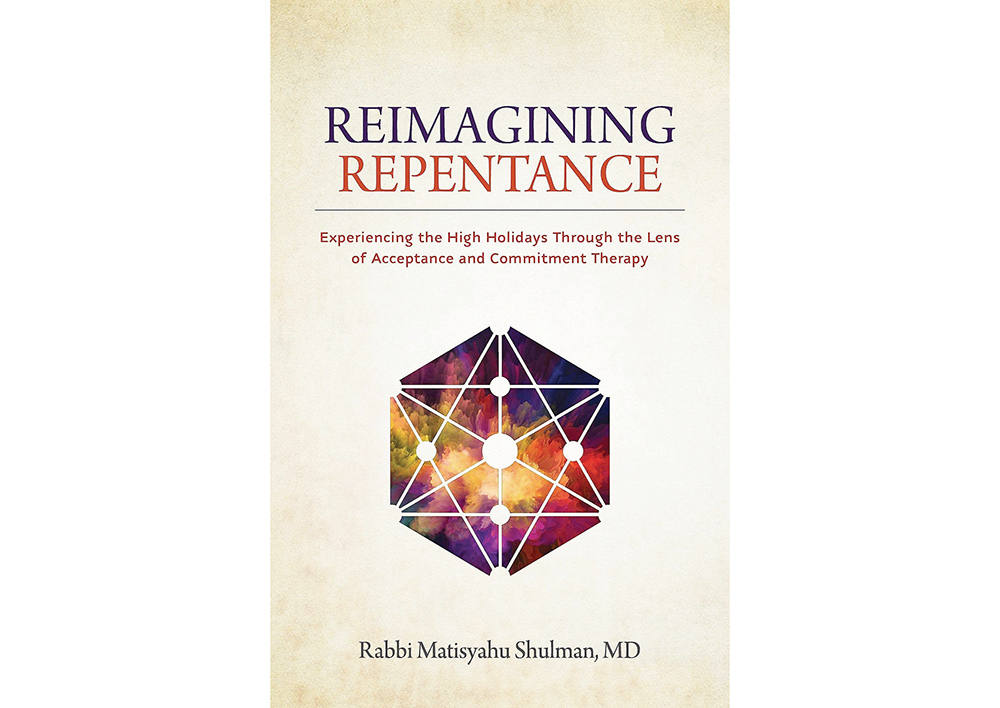
Reviewing: “Reimagining Repentance: Experiencing the High Holidays Through the Lens of Acceptance and Commitment Therapy” by Rabbi Matisyahu Shulman, MD. Kodesh Press. 2023. English. Paperback. 184 pages. ISBN-13: 979-8888940174.
Every year, Beit Midrash Zichron Dov of Toronto runs a program called “Tishrei in a Day.” People gather from all across the Greater Toronto area to attend multiple classes of differing genres and styles about Rosh Hashanah, Yom Kippur and Sukkot. Inevitably, certain unifying features would reveal themselves throughout the day despite the differences between these holidays. I couldn’t help but be reminded of this as I read through Rabbi Matisyahu Shulman, MD’s “Reimagining Repentance: Experiencing the High Holidays through the Lens of Acceptance and Commitment Therapy.”
Shulman, a general and addiction psychiatrist and YU-ordained rabbi, sought to “unify the world of the beit midrash in which I spent my formative years … with the modern psychological theories that make up my day-to-day life at present.” In that, “Reimaging Repentance” can be seen as the latest entry in a project to incorporate psychology and psychiatry into the Torah U’Madda framework that YU is known for. (Other recent examples include Rabbi Dr. Mordechai Schiffman’s “Psyched for Torah” and Rabbi Dr. Ethan Eisen’s “Talmud on the Mind” series.) Rather than focusing on the weekly Torah reading or talmudic discussions, Shulman places psychology in conversation with one of the most thought-provoking times of the Jewish year.
In addition to utilizing ideas from psychoanalysis, psychodynamic psychotherapy, behavioral and cognitive-behavioral therapy, and mindfulness-based therapies, Shulman also introduces readers to acceptance and commitment therapy (ACT). ACT approaches psychological difficulties through guidance in the following six domains:
- Acceptance: the ability to accept both negative and positive emotional experiences.
- Cognitive Defusion: The ability to distance the emotions and self through thoughts.
- Self as Context: The ability to remove the “self” from the labels, definitions, thoughts and emotions a person experiences.
- Values: Defining the basic ideals that give our lives meaning.
- Committed Action: The ability to behave in a way that aligns with our values.
- Contact with the Present Moment: The ability to live mindfully with the experience of the present.
ACT, Shulman argues, “is particularly relevant to a Torah philosophy because it recognizes the need to fully experience our emotions while at the same time demanding us to live by our values regardless of the experiences we are having.” He then provides numerous examples of how various aspects of the High Holiday season complement and are complemented by this understanding our psychological health:
Through Selichot we discover the concept of “self as context,” of allowing ourselves to connect with the part of ourselves that is unchanging regarding our experiences. In so doing, we create the flexibility to escape our previous patterns of thought and action. The shofar of Rosh Hashanah teaches us to relate to our negative thoughts in a new way. Through the Viddui of Yom Kippur, we learn to accept negative emotions. Finally, on Sukkot, we will experience the value of mindful, goal-oriented action.
Shulman synthesizes our practices with modern psychological understandings, as well as with insights from Jewish thinkers like Maimonides, Rebbe Nachman, Rav Dessler, Rav Kook and more in the hope of transforming what have largely become rote rituals into “moments of meaning, self-reflection, and change” in the lives of his readers. To that end, each chapter provides practical exercises in addition to a theoretical overview to allow readers to really practice what is preached.
If you are looking to utilize this time of year as productively as possible, “Reimaging Repentance” is a must-read.
“Reimaging Repentance” can be purchased from Kodesh Press, Eichler’s and Amazon.
Steven Gotlib is co-director of JET Ottawa’s Capital Jewish Experience and interim rabbi at Young Israel of Ottawa. He was previously assistant rabbi at the Village Shul and a community scholar at Beit Midrash Zichron Dov of Toronto. A graduate of Rutgers University, Rabbi Gotlib received rabbinic ordination from the Rabbi Isaac Elchanan Theological Seminary at Yeshiva University, a certificate in mental health counseling from the Ferkauf School of Psychology in partnership with RIETS, and a certificate in spiritual entrepreneurship from the Glean Network in partnership with Columbia Business School. He can be reached at [email protected].









